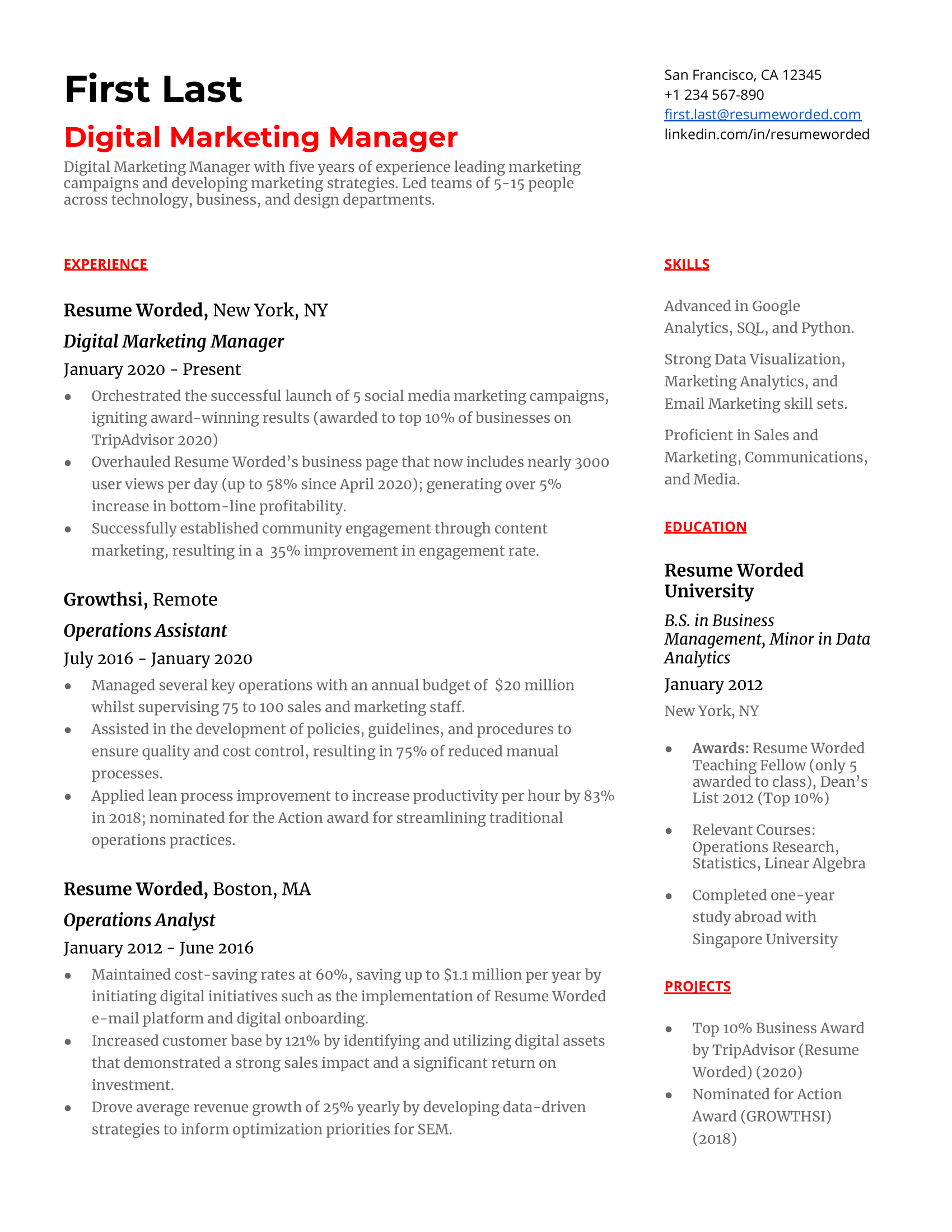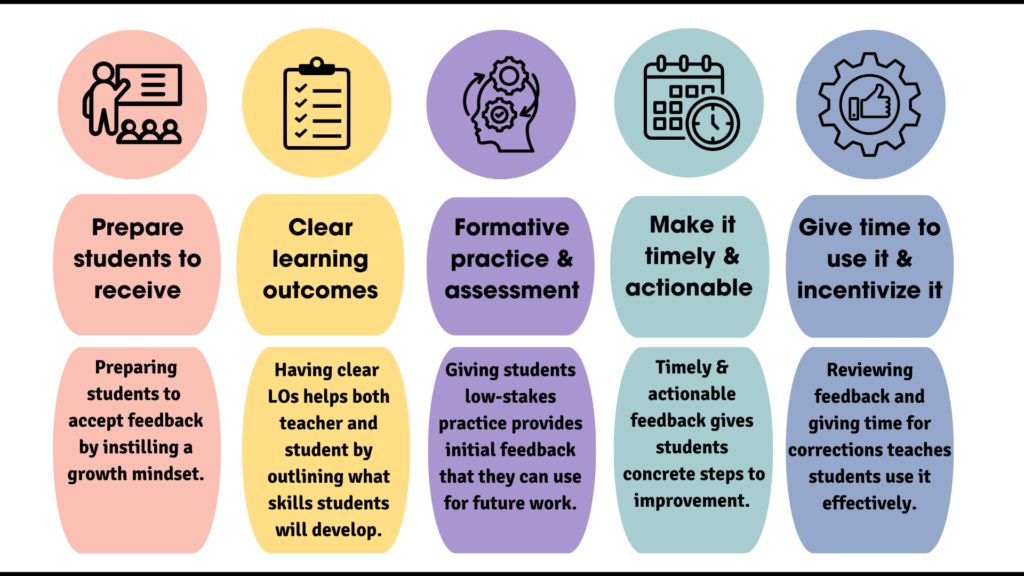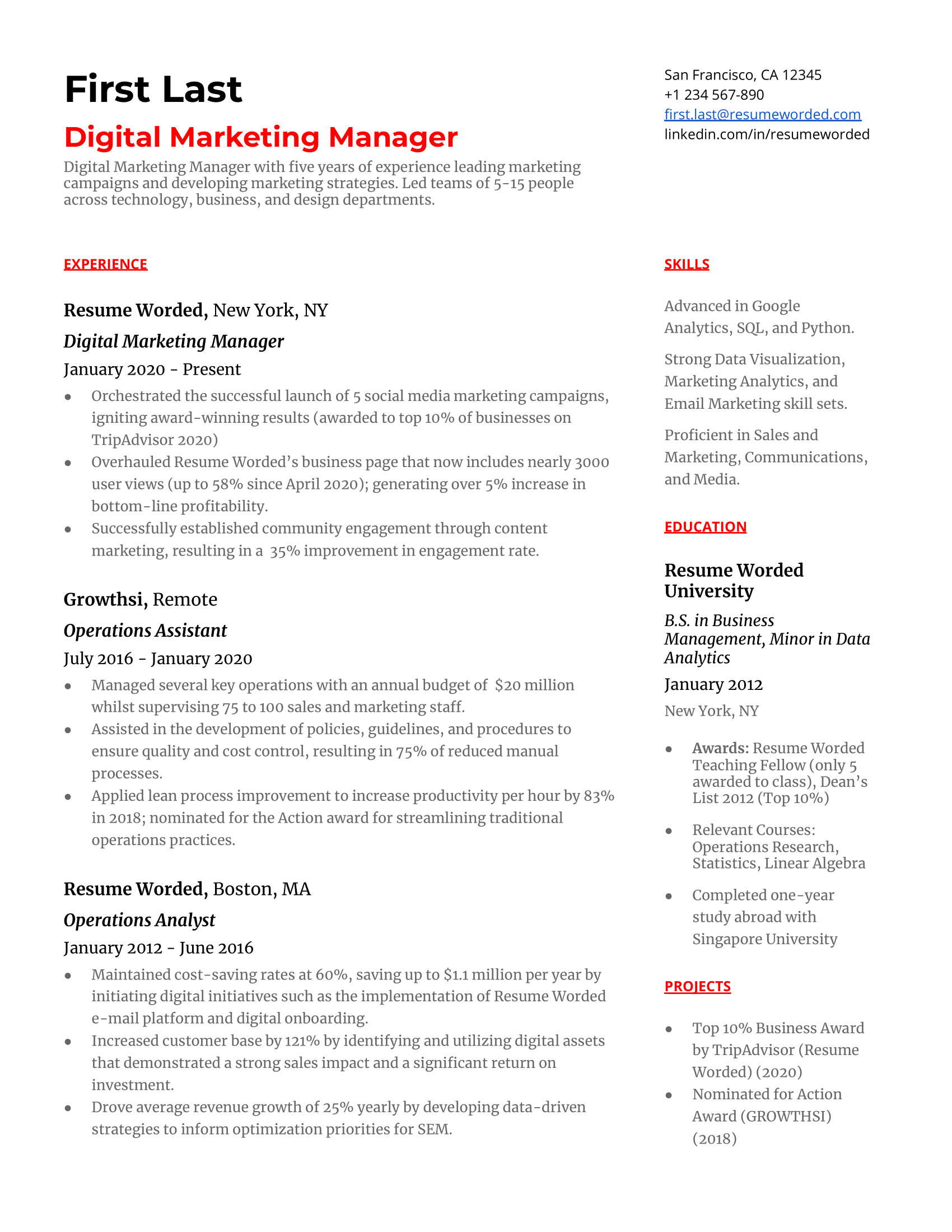Are you ready to supercharge your career? In today’s fast-paced job market, digital skills are no longer optional; they’re essential.
Whether you’re looking to climb the corporate ladder or simply enhance your day-to-day work, mastering these skills can set you apart from the competition. This guide is designed just for you. It’s practical, actionable, and packed with insights that you can implement right away.
From improving your online presence to harnessing the power of data, we’ll cover the key digital skills that every professional should have. Each section is tailored to help you take immediate steps toward your goals. Don’t miss out on the opportunity to elevate your professional game. Let’s dive in and unlock the digital skills that will transform your career!

Credit: resumeworded.com
The Importance Of Digital Skills
Digital skills are essential in today's world. They help professionals thrive in various fields. Understanding these skills can change your career. Many jobs now require basic digital knowledge.
Adapting To Modern Work Environments
Workplaces have changed a lot. Remote work and online tools are now common. Digital skills help you adapt quickly. Knowing how to use software is vital.
Collaboration tools are crucial for teamwork. They allow you to connect with colleagues easily. Skills in video conferencing and project management enhance communication. This makes work smoother and more efficient.
Staying Competitive In The Job Market
The job market is tough. Many candidates have similar qualifications. Digital skills can set you apart. Employers look for workers who can use technology effectively.
Understanding data analysis or social media can boost your resume. Being tech-savvy shows you are proactive. This can lead to better job opportunities.
Enhancing Productivity And Efficiency
Digital skills can make tasks easier. Using software tools can save time. Automating repetitive tasks allows you to focus on important work.
Learning to use spreadsheets or project management tools can increase productivity. These skills help you manage your time better. You can complete projects faster and with higher quality.

Credit: blogs.oregonstate.edu
Key Digital Skills For Professionals
Key digital skills are essential for today’s professionals. Mastering these skills not only boosts your employability but also enhances your daily productivity. Here’s a closer look at the digital skills you need to thrive in the workplace.
Basic Computer Literacy
Understanding basic computer functions is the first step in your digital journey. This includes knowing how to use operating systems, word processors, and spreadsheets. Navigating these tools with confidence can significantly improve your efficiency.
Consider how often you draft emails or create reports. Familiarity with software like Microsoft Word or Google Docs streamlines these tasks. It saves you time and helps you present your ideas more clearly.
Data Management And Analysis
Data is everywhere, and knowing how to manage it is crucial. You should be comfortable organizing data in spreadsheets or databases. Understanding basic data analysis can help you make informed decisions based on facts.
Imagine having the ability to analyze customer feedback and spot trends. This skill can lead to better products and services. Learning tools like Excel or Google Sheets can empower you to handle data effectively.
Digital Communication Tools
Effective communication is vital in any profession. Familiarity with tools like Slack, Zoom, or Microsoft Teams can enhance your collaboration with colleagues. These platforms facilitate seamless interaction, especially in remote work settings.
Have you ever been part of a project where miscommunication led to confusion? Using the right tools can help avoid such issues. Ensure you know how to utilize features like screen sharing and messaging efficiently.
Cybersecurity Awareness
Cybersecurity is a growing concern for professionals. Understanding basic security measures protects both your information and your company’s data. This includes recognizing phishing attempts and using strong passwords.
Have you received a suspicious email recently? Knowing how to identify potential threats is crucial. Regularly updating your security software and being aware of online safety practices can safeguard your digital life.
Project Management Software
Project management tools like Trello, Asana, or Monday.com help you organize tasks and collaborate effectively. Familiarity with these platforms can enhance your ability to meet deadlines and track progress. They provide a clear overview of project timelines and responsibilities.
Have you ever struggled to keep track of multiple tasks? Using project management software can alleviate that stress. These tools allow for easy updates and communication, keeping everyone on the same page.
Investing time to develop these key digital skills can transform your professional life. Which of these skills do you feel you need to work on? By enhancing your digital proficiency, you're not just keeping up; you're setting yourself apart.
Mastering Software And Tools
Understanding software and tools is key for today’s professionals. Many jobs require specific skills. Learning these tools helps you work better and faster. This guide will break down essential software categories. Each section gives you clear insights.
Essential Office Applications
Office applications are the backbone of daily tasks. Programs like Microsoft Word and Excel are vital. They help with writing documents and managing data.
Learn to format documents. Use templates for quick starts. Know how to create charts in Excel. This helps in presenting data clearly. Simple shortcuts can save time, too.
Cloud-based Collaboration Platforms
Cloud platforms allow teams to work together from anywhere. Tools like Google Drive and Dropbox make sharing easy. You can store files online, access them anytime.
Using these tools improves teamwork. Collaborate on documents in real-time. Communicate with your team through comments and suggestions. This creates a smooth workflow.
Design And Creative Tools
Creative tools help you create visuals and presentations. Software like Canva and Adobe Spark are popular choices. They are user-friendly and offer many templates.
Learn to design simple graphics. Focus on color schemes and fonts. These elements impact your message. Good design grabs attention and conveys ideas clearly.
Crm And Marketing Automation Systems
Customer Relationship Management (CRM) tools help track interactions. Platforms like HubSpot and Salesforce keep customer data organized. They also help manage sales processes.
Use these systems to understand customer needs. Automate marketing tasks to save time. Email campaigns and lead tracking become easier. This leads to better customer relationships.
Developing Problem-solving Skills
Developing problem-solving skills is essential for professionals in today’s digital landscape. As challenges arise, having the ability to address them effectively can set you apart. Whether you're troubleshooting technical issues or learning from setbacks, these skills are invaluable.
Troubleshooting Technical Issues
Technical problems can arise at any moment. You might find your software crashing right before a big presentation. Knowing how to troubleshoot these issues quickly can save you from unnecessary stress.
- Start by identifying the problem. Ask yourself, what changed before the issue occurred?
- Check for common issues, like loose cables or software updates that may have failed.
- Consult the help section or user manual for guidance.
Don’t hesitate to ask colleagues for help. Collaboration can lead to faster solutions. Remember, every technical challenge you face is an opportunity to learn.
Adopting A Growth Mindset
A growth mindset is crucial for effective problem-solving. It encourages you to view challenges as opportunities to learn rather than obstacles. This shift in perspective can make all the difference.
Consider a time when you faced a setback. Did you let it deter you, or did you analyze what went wrong? Embracing mistakes as a chance to grow can empower you in your professional journey.
Set specific goals for yourself. Challenge yourself to tackle new problems each week. This practice will enhance your ability to adapt and think critically.
Leveraging Online Resources
The internet is a treasure trove of information. When you encounter a problem, don’t forget to tap into online resources. Forums, tutorials, and webinars can provide immediate assistance.
- Join professional groups on social media platforms. Engaging with peers can offer unique insights.
- Use video platforms for step-by-step guides on troubleshooting.
- Follow industry leaders who share tips and strategies to overcome common challenges.
Make it a habit to bookmark useful websites. Create a personal resource library that you can refer to when needed. The more you utilize these resources, the more confident you will become in solving problems.
What strategies do you currently use to tackle challenges? Embrace these tips to enhance your problem-solving skills and watch your confidence grow.
Building A Digital Skillset Strategy
Building a digital skillset strategy helps professionals grow in their careers. This practical guide offers easy steps to improve essential digital skills. Learn how to adapt to new tools and technologies effectively.
Building a Digital Skillset Strategy is essential for professionals aiming to thrive in today's tech-driven world. A well-structured strategy allows you to focus on the skills that matter most in your industry. This guide will help you create a roadmap to enhance your digital capabilities effectively.Identifying Industry-specific Needs
Understanding what skills are most valuable in your field is the first step. Research your industry trends and demands. - Talk to Peers: Engage with colleagues to find out what skills they consider essential. - Job Listings: Review job postings to see what employers are looking for. - Professional Associations: Join relevant groups that often provide insights into skill gaps. This research will help you pinpoint the digital skills necessary for your career advancement.Setting Learning Priorities
Once you've identified your industry's needs, prioritize your learning. Determine which skills will give you the most significant impact on your career. - Create a List: Write down the skills you want to learn and rank them based on importance. - Set Short-Term Goals: Break down your learning into manageable tasks. For example, if you want to learn data analysis, set a goal to complete an online course in the next month. This structured approach keeps you focused and motivated.Tracking Progress And Improvement
Monitoring your growth is crucial for staying on track. Use tools and methods that work best for you. - Journaling: Keep a digital or physical journal to note your learning experiences and challenges. - Online Tools: Consider using apps like Trello or Asana to manage your learning tasks. Regularly review your progress. Ask yourself, “What skills have I developed, and what areas still need improvement?” Setting milestones can also help you celebrate your achievements. Recognizing small victories keeps your motivation high. Building a robust digital skillset strategy is about being proactive and intentional. Your career growth hinges on your ability to adapt and learn in this evolving landscape. What steps will you take today to enhance your digital skills?
Credit: resumeworded.com
Upskilling Through Online Learning
Online learning is a great way to improve skills. It offers flexibility and access to many resources. Professionals can learn at their own pace. This method fits well into busy schedules. Finding the right courses can lead to career growth.
Choosing The Right Platforms
Selecting the right platform is key. Many websites offer courses. Some are free, while others charge a fee. Look for platforms with good reviews. Check if they provide certificates. Popular platforms include Coursera, Udemy, and LinkedIn Learning.
Consider your learning style. Video courses suit visual learners. Text-based courses may work better for others. Find a platform that matches your needs. Explore different options before deciding.
Balancing Learning With Work
Balancing work and learning is important. Set aside specific times for study. Use breaks or quiet hours at work. Short, focused sessions can be effective. Aim for consistency rather than long hours.
Communicate with your employer. They may support your learning. Some companies offer resources or time off for training. Make learning a priority. This can lead to better job performance.
Certifications And Their Value
Certifications can enhance your resume. They show commitment to learning. Many employers value these credentials. They can open doors to new job opportunities.
Research the certifications in your field. Some are industry-specific. Others are more general but still valuable. Choose certifications that align with your career goals. Keep your skills relevant and up to date.
Networking In The Digital World
Networking in the digital world is essential for professionals today. This guide offers practical steps to improve digital skills. Learn how to connect, share ideas, and grow your network online effectively. Enhance your career by building valuable relationships in the digital space.
Networking in the digital world has transformed how professionals connect and collaborate. It’s no longer limited to face-to-face meetings or business cards. Now, your next meaningful connection could be just a click away.Using Linkedin Effectively
LinkedIn is your go-to platform for professional networking. It's not just about having a profile; it’s about optimizing it. Start by ensuring your profile is complete and showcases your skills and achievements. Engage with your network. Share relevant articles, comment on posts, and participate in discussions. This not only keeps you visible but also positions you as a thought leader in your field. Consider reaching out to former colleagues or industry peers. A simple message to catch up can lead to unexpected opportunities. Personalize your connection requests to stand out.Participating In Online Communities
Online communities are rich with opportunities to connect. Platforms like Reddit, Facebook Groups, or industry-specific forums can help you find like-minded professionals. Join discussions and ask questions. Sharing your knowledge can lead to meaningful interactions. Don't hesitate to offer help. If someone is seeking advice, provide your insights. This builds trust and establishes your presence in the community.Building A Personal Brand
Your personal brand is how you present yourself online. It’s crucial for standing out in a crowded digital space. Start by identifying what you want to be known for. Create consistent content that reflects your expertise. This could be blog posts, videos, or podcasts. Share your experiences and insights. Don’t forget to engage with your audience. Respond to comments and messages. This fosters a sense of community and encourages others to connect with you. Networking in the digital world requires intention. Are you ready to take your connections to the next level?Leveraging Digital Skills For Career Growth
Digital skills are key for career growth. They help you stand out in a crowded job market. Employers seek candidates who can adapt and innovate. Learning these skills can boost your confidence and open doors.
From coding to social media, digital skills have many forms. Each skill can help you in different ways. They allow you to take on new challenges and responsibilities. This guide explores how to leverage these skills effectively.
Showcasing Skills In Resumes
Your resume is your first impression. Highlighting digital skills can make it shine. Use specific keywords that match the job description. Mention software programs and tools you know well. Include examples of how you used these skills in past roles.
Employers want to see real results. Use numbers to show your impact. For instance, "Increased social media engagement by 30%." This gives a clear picture of your abilities. Tailor your resume for each application. Make it relevant to the job you want.
Using Analytics To Measure Impact
Analytics are powerful tools for measuring success. Use them to track your work's impact. For instance, monitor website traffic or social media metrics. These numbers tell a story about your efforts.
Regularly review your analytics. Identify trends and areas for improvement. This approach shows your commitment to growth. Sharing these insights with your team can foster collaboration. It also highlights your analytical skills to management.
Contributing To Team Success
Digital skills are not just for individual success. They can enhance team performance. Share your knowledge with colleagues. Offer to lead training sessions or workshops.
Collaboration tools can boost teamwork. Familiarize yourself with platforms like Slack or Trello. These tools help streamline communication and project management. Your contributions can lead to better outcomes for the entire team.
Being a digital resource for your team adds value. It shows you are engaged and proactive. This can lead to new opportunities and promotions.
Frequently Asked Questions
What Digital Skills Are Essential For Professionals?
Essential digital skills include data analysis, social media management, and digital communication. Proficiency in software tools, coding basics, and cybersecurity awareness is also crucial. These skills enhance productivity and enable effective collaboration in today’s digital workspace.
How Can I Improve My Digital Skills?
To improve your digital skills, consider online courses and workshops. Platforms like Coursera and LinkedIn Learning offer valuable resources. Additionally, practice using software tools and engage in projects that challenge your abilities. Networking with skilled professionals can also provide guidance and insights.
Why Are Digital Skills Important For Career Growth?
Digital skills are vital for career growth as they enhance employability. Many industries rely on technology for operations and communication. Being digitally proficient allows professionals to adapt quickly to changes and seize new opportunities. This adaptability is increasingly important in a competitive job market.
Where Can I Find Digital Skills Training?
You can find digital skills training through various online platforms. Websites like Udemy, edX, and Skillshare offer a range of courses. Many community colleges and local organizations also provide workshops. Check out industry-specific training resources for tailored learning experiences.
Conclusion
Digital skills are essential in today’s professional world. They help you stay relevant and competitive. This guide offers practical steps to enhance your skills. Start with small, achievable goals. Practice regularly to build confidence and competence. Share your knowledge with others.
This creates a supportive learning environment. Keep learning and adapting to new tools. The digital landscape changes quickly. Staying updated is key for your success. Embrace these skills to advance your career. Your journey in the digital world begins now.
Take the first step today.
Comments
Post a Comment